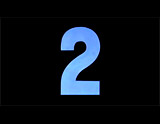
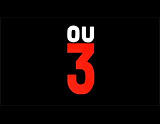
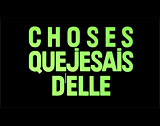
|
2 or 3 Things I Know
About Her (1967, Fr.) (aka 2 ou 3 Choses que Je Sais D'elle)
In Jean Luc-Godard's self-narrated Nouvelle Vague (New
Wave) film, a Cinemascopic comedy and drama about the daily life
of a Parisian housewife/part-time prostitute, including thought-provoking
philosophical and metaphysical discourses on the social injustice
of the Vietnam War and people's indifference to it, the rapid rise
of materialism and consumerism and the evils of capitalism, the increase
in depersonalized. faceless high-rise apartments (as a sign of progress),
dependence on television ("If you can't afford LSD, try color
TV"), and the loveless, commodity-driven nature of prostitution-sex:
- the whispered (voice-over) musings of director/writer
Godard included a description of the daily routine of Juliette
Jeanson (actress Marina Vlady), a married, bored suburban housewife,
living in a newly-built high-rise apartment on the outskirts of
Paris with her distracted, shortwave-radio listening, bespectacled
husband Robert Jeanson (Roger Montsoret), a mechanic, and two children:
precocious Christophe (Christophe Boursellier) and Solange (Marie
Boursellier); she often dropped her children at an apartment-daycare
center (that doubled as a 'brothel' decorated with travel posters
and managed by Monsieur Gérard (Joseph Gehrard))
- with a pontificating discourse about the commercialization
of culture, Juliette would travel to downtown Paris to engage in
shopping for clothes, to visit a salon and spend time in a cafe,
with occasional daytime appointments with clients as a part-time
prostitute (to pay for her lifestyle)
- the hotel room scene of Juliette and Marianne (Anny
Duperey) with a male client, visiting American John Bogus (Raoul
Levy), a US war correspondent wearing a T-shirt of the stars and
stripes, who urged the two women not just to have sex - but to engage
in his preferred fetish - getting naked and wearing airline travel
bags (with corporate logos of TWA and Pan AM - both defunct companies!)
on their heads before parading around
- the brief shots of news-footage images and Life
Magazine photos of the horrors of the Vietnam War, including
its effects on innocent children, a point-blank execution, and
napalm bombings of the jungles of North Vietnam - juxtaposed
with 'pornography' in the bedroom (off-screen)
- the humorous scene of a young woman (Helena Bielicic)
bathing in her apartment bathtub when suddenly, an electric meter
reader (Robert Chevasue) barged in after knocking: ("Power company,
where's the meter?"); he paid no attention to her hiding her
nakedness behind a towel, and warned her about her exorbitant bill: "This
will hurt: 50,000 francs"
- Godard's voice-over criticisms of consumption and
capitalistic materialism, with frequent pop-art images, and dominant
tri-colors (red, white and blue):
"The mere fact of suddenly enjoying a new appliance spurs power
consumption without regard for the bill. It's the same old story: either
no money for rent or no TV, or else a TV but no car, or else a washer
but no vacation. In other words, in any case, no normal life"
- the sequence in the cafe of two women viewing (from
different angles) images in the pages of a fashion magazine of cartoonish,
degrading pop-art female faces and bodies; one female's lips were
branded with the Union Jack flag design
- the film's most celebrated image or camera shot: a
lengthy close-up of a cup of coffee in a Parisian cafe - viewed with
ever increasing close-ups as a swirling black representation of the
universe or solar system: "But first of all, what is an object?
Maybe an object is what serves as a link between subjects, allowing
us to live in society, to be together. But since social relations
are always ambiguous, since my thoughts divide as much as unite,
and my words unite by what they express and isolate by what they
omit, since a wide gulf separates my subjective certainty of myself
from the objective truth others have of me, since I constantly end
up guilty, even though I feel innocent, since every event changes
my daily life, since I always fail to communicate, to understand,
to love and be loved, and every failure deepens my solitude, since
- Since. Since I cannot escape the objectivity crushing me, nor the
subjectivity expelling me, since I cannot rise to a state of being
nor collapse into nothingness... I have to listen, more than ever
I have to look around me, at the world, my fellow creature, my brother
(mon semblable, mon frere)"
|
Voice-Over Metaphysical Musings During a Close-Up
of a Coffee Cup
|

|

|
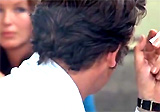
|

|
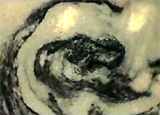
|
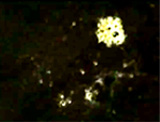
|
- the voice-over continued after a slight pause of
intercutting shots in the cafe (Juliette kept glancing over at
a prospective john): "The world alone. Today, where revolutions
are impossible, and bloody wars loom, when capitalism is unsure
of its rights and the working class is in retreat, when the lightning
progress of science makes future centuries hauntingly present,
when the future is more present than the present, when distant
galaxies are on my doorstep -- My fellow creature, my brother (mon
semblable, mon frere)"
- again, a pause (a cube of sugar appeared to have been
dropped in and began to dissolve) before a continuation of the voice-over
about the spiraling pattern on the surface of the black liquid: "Where
do we start? But start what? God created heaven and earth, sure,
but that's too easy. We should put it better: Say that the limits
of language are the world's limits, that the limits of my language
are my world's limits, and that when I speak, I limit the world,
I finish it. And one inevitable and mysterious day, death will come
and abolish these limits, and there will be no questions nor answers.
It will all be a blur. But if by chance things come into focus again,
it may only be with the advent of conscience. Everything will follow
from there"
- one of the closing shots - volcanic-like pulsations
and fiery explosions seen in a glowing cigarette tip (Juliette was
lighting her cigarette in bed next to her husband): another symbol
of the universe
- the famous final image or tableau - a zoom out from
a box of Hollywood chewing gum (standing in front of a color photo
of a loving couple), to view a bright collection of packaged, household
consumer cleaning products arranged on a dying grassy field - as
if they were seen from an aerial view as a model of an apartment
building complex, or more morbidly, as cemetery markers
|
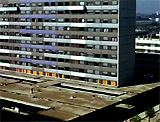
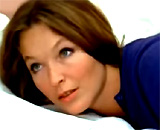
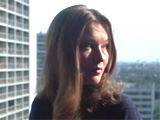
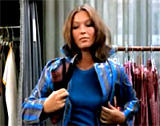
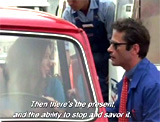
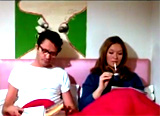
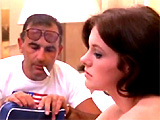
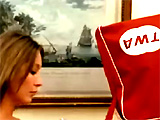
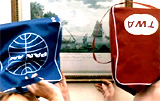

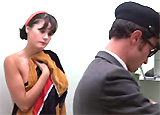
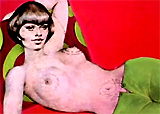
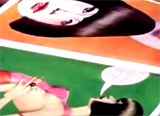
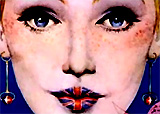
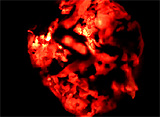
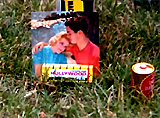
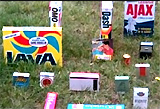
|




















